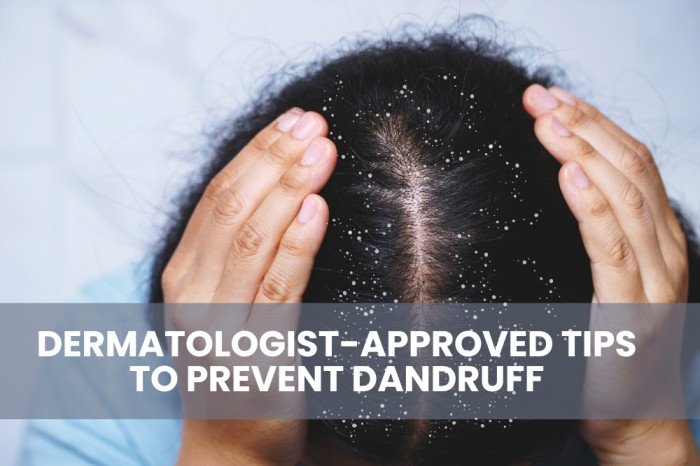Dandruff is a common scalp condition that can affect people of all ages. It is uncomfortable and unsightly, and it also causes flaking and itching. It can be caused by an overgrowth of the naturally occurring yeast Malassezia on the scalp, dry skin, or skin conditions like seborrheic dermatitis or psoriasis. Dandruff can also be caused by several things, such as being sensitive to certain hair care products, not washing your hair often enough, or even your diet. Dandruff isn’t usually a significant problem, but it can make you feel bad about yourself. If you take the right steps to prevent dandruff and are careful, you can easily control or even avoid it. This blog post offers tips from dermatologists that will help you keep your scalp healthy and free of flakes and dandruff.
Massage With Oil
It is suggested to massage dry, scaly scalps using natural oils such as olive oil, coconut oil, or similar products to avoid the formation of dandruff. Keeping oil for longer than thirty to forty-five minutes is not recommended. An additional benefit of adding a few drops of tea tree oil to your shampoo is its antifungal properties, which help to control yeast on the scalp. In addition to nourishing your scalp, regular oil massage will encourage your oil glands to produce an adequate quantity of natural oil. In the long run, this will stop sebum production and eliminate dandruff.
A Healthy Diet
A good diet is often suggested for a healthy body, and many dermatologists also recommend a balanced diet to keep the scalp and skin healthy. Eating junk food, which is often called “bad food,” can cause a lot of health concerns, such as dandruff, which is just one example. Poor diets make hormones rise, which makes sebum production rise, which makes dermatitis grow. To help with your dandruff condition, you might want to eat more fruits and vegetables and fewer sweets and fatty foods. Eating foods high in omega-3 fatty acids, such as walnuts and flaxseeds, can help with dandruff and make your hair healthier overall. You can also get a customized diet plan from a nutritionist to deal with the dandruff.
Maintain Stress
It is a recognized fact that stress can exacerbate dandruff in some individuals, and research has shown that dandruff is linked to stress. When faced with a challenging scenario, our usual response is to fiddle with our hair or scratch our heads in confusion. If you already have dandruff, touching your scalp too often can spread the dirt and oils from your hands to your scalp, making the problem worse. A relaxing activity, like going for a walk or doing yoga, may do wonders for your scalp and your mental and emotional health.
Drink More Water and Hydrate Yourself
Hydration is a therapy that physicians recommend for dandruff, and it also plays a vital role in the bulk of the activities that take place within our bodies. It is recommended by a number of medical professionals that an individual drink a minimum of eight glasses of water on a daily basis. Additionally, the scalp is a form of skin, and drinking water helps to prevent the scalp from becoming dry and flaky, which in turn helps to prevent breakouts.
Wash Your Hair Regularly
Washing your hair two to three times a week removes dead skin cells and extra oil from your scalp. Using an anti-dandruff shampoo in your hair care routine is an effective method for treating dandruff and scalp-related issues. This approach makes it much easier to avoid accumulation and buildups.
Avoid Overstyling
When preventing the occurrence of dandruff, it is strongly suggested that you reduce the quantity of hair products that you use on your hair. Some hair products, such as gels and sprays, have a propensity to build up on the scalp, which can make the symptoms of dandruff even more noticeable and uncomfortable. These products have a propensity to accumulate on the scalp rather than being removed.
Contributing Compounds
Dermatologists often suggest using over-the-counter (OTC) medicines with ingredients that help make dandruff less severe and reduce the chance of buildup. Those medicines will help to get rid of the extra scaling on the scalp before it turns into flakes. But if you use too much of it, it could make your scalp too dry, which could make your dandruff worse. Selenium sulfide is an antifungal compound that can kill the fungus that causes dandruff.
Say Bye To Dandruff With Dermatological Expert Advice
Managing dandruff can be a difficult problem. But with proper guidance from a dermatologist, you can keep dandruff under control. To keep your scalp healthy, you need to do a few things, such as choosing the right shampoo, giving your scalp the nutrients it needs, learning how to deal with stress, and eating healthy foods. If the symptoms persist or intensify, get help from an expert.
We at STEPS Clinic know that the condition of a person’s skin and scalp has a direct effect on their self-esteem and comfort. We offer a wide range of medical services, such as gynecology, pediatrics, internal medicine, and advanced cosmetic treatments. Our expert doctors and surgeons work hard to make sure that every one of our patients gets care that is both personalized and up-to-date. Whether you’re dealing with dandruff or another skin issue, STEPS Clinic is here to help you get better. Contact us to book an appointment with our skin specialist.

